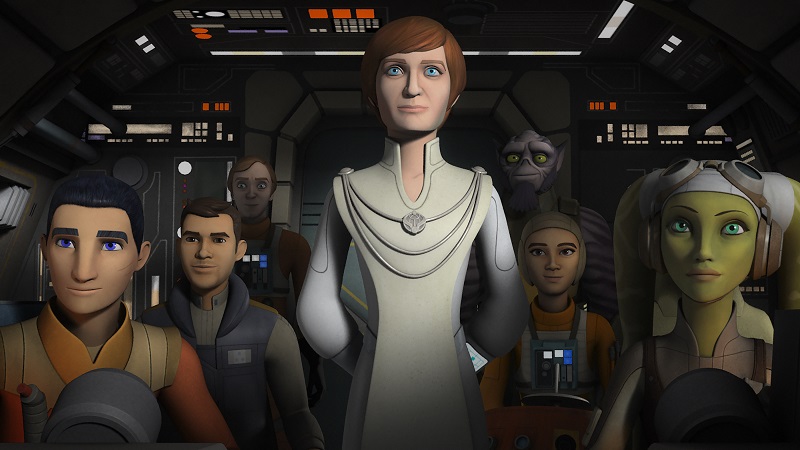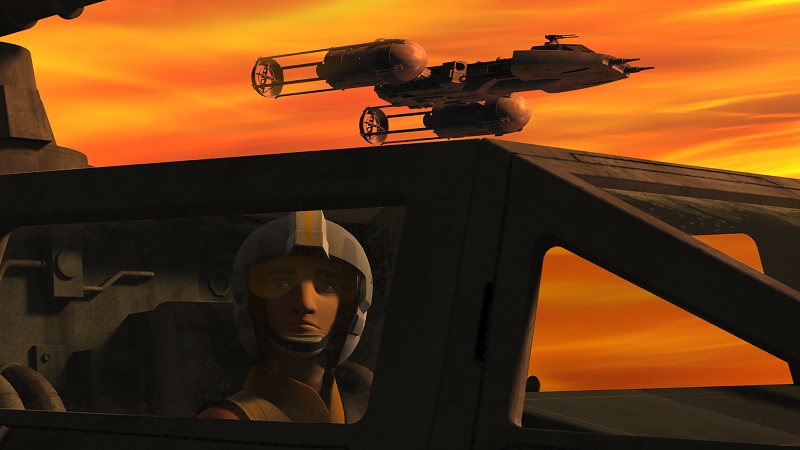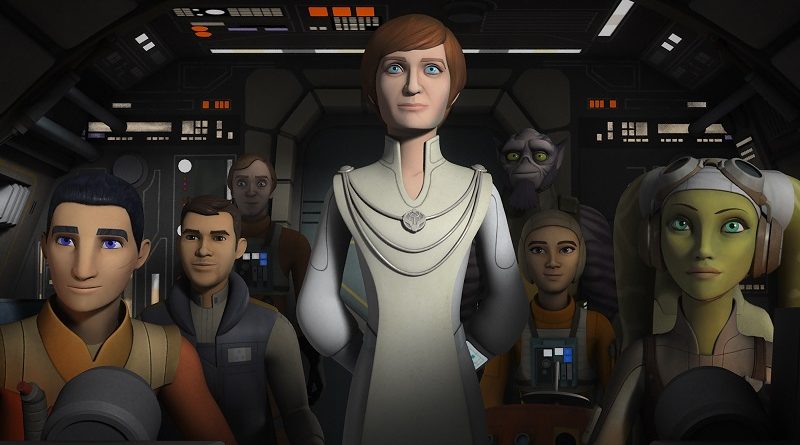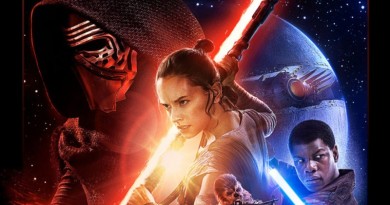Star Wars Rebels: Secret Cargo Review
 War has been described as the ultimate political solution, one reached when all other alternative efforts have failed. Rebels reveals in “Secret Cargo” when it was that the greatest political leader of the Rebel Alliance finally accepted that no other solution, but war, remained left to stop the Empire and Emperor Palpatine. In the lore which has been built over the past several years through the release of reference guides such as Star Wars Propaganda and Rogue One: The Ultimate Visual Guide, the moment that Mon Mothma resigned her seat in the Imperial Senate is a crucial turning point in the evolution of the rebellion against the Empire. The rather mundanely named “Secret Cargo” reveals that moment, importantly for the story of the rebels but also for the show’s commitment to placing women in the spotlight.
War has been described as the ultimate political solution, one reached when all other alternative efforts have failed. Rebels reveals in “Secret Cargo” when it was that the greatest political leader of the Rebel Alliance finally accepted that no other solution, but war, remained left to stop the Empire and Emperor Palpatine. In the lore which has been built over the past several years through the release of reference guides such as Star Wars Propaganda and Rogue One: The Ultimate Visual Guide, the moment that Mon Mothma resigned her seat in the Imperial Senate is a crucial turning point in the evolution of the rebellion against the Empire. The rather mundanely named “Secret Cargo” reveals that moment, importantly for the story of the rebels but also for the show’s commitment to placing women in the spotlight.
While Rebels suffers still from the lack of women in the creative chair behind its production, it has been making a continual effort to put them in front of the virtual camera. The primary female characters, Mon Mothma and Hera Syndulla, not only knock the Bechdel Test out of sight with their discussion of their mutual battlefields, one political and one literal, but both display true leadership abilities. Mothma, voice by Genevieve O’Reilly, who played the stirring leader in Rogue One, recounts her efforts to save lives and worlds in the Senate as the build up to her decision to reject politics as the solution to stop the Emperor. This conversation with Hera serves the important purpose of emphasizing the significance of the political system, the idea of democracy, is to the senator. Thus, her resignation and call to arms at the conclusion of the episode carries the appropriate amount of weight. Even afterward, for those who have dipped into the excellent Rogue One novelization by Alexander Freed, will know that even as a rebel, Mothma yearns for a diplomatic conclusion to the rebellion. At her side, Hera continues to make the decisions that will one day see the Twi’lek commander become a general.
As one more occasional reminder, for as wonderfully written Hera is as a female character, an alien woman is not an appropriate stand in for women in general. This is something which the Rebels writers and animators seem aware of, adding a woman Imperial captain to the ranks of the enemy, and in “Secret Cargo” choosing to make one of the Gold Squadron pilots a woman of color. (It should also be noted that one of the other pilots was also a person of color.) An additional nice touch by the writers was how they handled the replacement of that woman pilot with Ezra, who apparently has been busy receiving piloting lessons from Hera, whom he praises.
 At the conclusion of the episode, Gold Two, who was initially confrontational with the members of Phoenix Squadron, welcomed Ezra to fly with her any time. If it had ended with that, with the guy receiving accolades from the female pilot on how great he was, then it might have come across as a stale bit of writing. However, Ezra is animated to show true delight at receiving such validation from Gold Two – elevating the place of the pilot in the context of the episode.
At the conclusion of the episode, Gold Two, who was initially confrontational with the members of Phoenix Squadron, welcomed Ezra to fly with her any time. If it had ended with that, with the guy receiving accolades from the female pilot on how great he was, then it might have come across as a stale bit of writing. However, Ezra is animated to show true delight at receiving such validation from Gold Two – elevating the place of the pilot in the context of the episode.
“Secret Cargo,” despite having such a consequential moment in the rebellion’s history visualized, is not a complicated episode. It’s rather forthright, with the crew of the Ghost having to take on Mon Mothma and escort her to safety after her own ship was destroyed by pursuing Imperials. Regardless of how straightforward the story advanced, the quality of the episode was superb in its production. As previously noted regarding the treatment of the female character, the writing was spot on, and this included the momentary appearance of Grand Admiral Thrawn. Thrawn’s scene was everything we have come to expect from the deducing imperial officer. Thrawn not only already knows the means by which Hera plans to sneak Mon Mothma out to safety, but has already ordered the ships, including his prototype TIE Defender, to be ready to take action. Had Hera not outwitted the Imperials with help from Ezra, the story of Mon Mothma would have come to a quick end courtesy Thrawn.
“Secret Cargo” also balanced two stories at once, scenes between Hera and Monthma in the cockpit of the Ghost and Ezra and Gold Leader’s fight with the TIE Defender, without missing a beat. Beyond the writing, the animation of the nebula that the rebels venture through, along with the visuals of star destroyers buffeted by flames of explosive gas, was simply breathtaking in scope. Stir in some exemplary music by Kevin Kiner, and one could watch “Secret Cargo” with the dialogue off and still fully understand the story and its emotional beats.
Ultimately, the story of the rebellion against the Empire is one of freedom fighters against a tyrannical government. It’s a conflict between inherent rights of the individual versus an oppressive system that happily counts those rights as collateral in its effort to establish order in the galaxy. “Secret Cargo,” picks up the subtle warning against the rise of such governments from last week’s “Through Imperial Eyes” with the normalcy of individuals like Wullf Yularen and expands upon it by stating that democracy does not fall at once, but bit by bit. It was the failure of the Senate to stop the Emperor when it had a chance, succumbing to a death by a thousand cuts, and it was only the realization that democracy no longer existed in practice (only form) which drove Mon Mothma to pursue the last political option, war. In an age when the drum beats for war, figuratively and literally, seem to be called upon quickly, that Rebels opted to showcase a leader who sees it as only the last resort is refreshing. With “Secret Cargo,” Rebels continues to find success in its strengths, strong female characters, thoughtful writing, and the quite rebellious knack for quietly asking its viewers to consider politics with new perspectives while enjoying Star Wars at its best.
For more on “Secret Cargo,” check out the episode guide on StarWars.com.
- Star Wars The Mandalorian – The Reckoning and Redemption Review - January 15, 2020
- Star Wars: The Mandalorian –The Prisoner Review - January 11, 2020
- Star Wars Resistance – Station to Station Review - January 7, 2020










